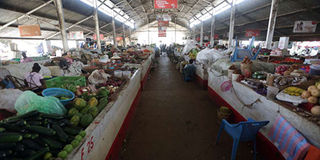Kisumu market that began as barter trade hub

Jubilee Market in Kisumu Town, on December 9, 2019. Its history dates back to the colonial era. Its foundation stone was laid in 1935. PHOTO | ONDARI OGEGA | NATION MEDIA GROUP
What you need to know:
- The market would draw people from the Luo, Luhya and Kalenjin communities. And despite their conflicts, Chiro Mbero would unify them.
- Culture expert Dan Ogola says the market provided a forum for cultural understanding, tolerance and peace.
Locally known as Chiro Mbero, Jubilee Market located on the Kisumu- Nairobi Road is arguably the oldest and only market in Kisumu Town’s central business district.
“Chiro” means market while “Mbero” means a small, traditional stool. Historically, the Chiro Mbero was a meeting place for local communities to carry out barter trade.
Bordering the main Kisumu bus park, the market gets a lot of traffic. Famous for its fresh farm products, the market is oddly busy in the morning, with a huge population of the Asian Community flocking it to buy vegetables and spices.
Boasting up to 350 demarcated stalls, it is a one-stop shop for traditional herbs, household goods, kienyeji chicken, and a variety of fish.
It is one of the largest enclosed markets in East Africa.
SEGREGATION
The history of Jubilee Market dates back to the colonial era. Its foundation stone was laid in 1935.
The market was intended strictly for Africans to prevent them from interacting with the colonialists.
The market would draw people from the Luo, Luhya and Kalenjin communities. And despite their conflicts, Chiro Mbero would unify them.
In fact, Kisumu Town draws its name from the word “sumo”, meaning a place where people trade.
Mr Dan Ogola, who is in charge of Western Kenya Monuments and Cultural Sites, says the market provided a forum for cultural understanding, tolerance and peace.
The men and women and women who visited it wore only a loincloth made from animal skin.
MORAL OBLIGATION
During the pre-colonial era, barter trade was the most common means of acquiring things at most markets.
"With Chiro Mbero, one would get food items without paying. It was done as moral obligation knowing one would return the same favour in future. It was typically an African affair," says Mr Ogola.
The place was known for exchanging fish, grains, bananas, animal products such milk, meat, skin and ghee. It has 1,200 traders, most of them women.
But the traders face gloomy times. The car park barely accommodates 10 vehicles; and the drainage system needs upgrading.
The market was last given major facelift by the Pakistani Embassy in 2001, during the town’s centenary celebrations.
Is there a site you want us to feature? Write an e-mail to mailbox @ke.nationmedia.com




